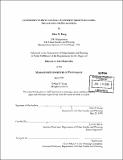| dc.contributor.advisor | Jennifer Davis. | en_US |
| dc.contributor.author | Kang, Alice H., 1976- | en_US |
| dc.contributor.other | Massachusetts Institute of Technology. Dept. of Urban Studies and Planning. | en_US |
| dc.coverage.spatial | f-ug--- | en_US |
| dc.date.accessioned | 2011-12-09T21:18:59Z | |
| dc.date.available | 2011-12-09T21:18:59Z | |
| dc.date.copyright | 1999 | en_US |
| dc.date.issued | 1999 | en_US |
| dc.identifier.uri | http://hdl.handle.net/1721.1/67526 | |
| dc.description | Thesis (M.C.P.)--Massachusetts Institute of Technology, Dept. of Urban Studies and Planning, 1999. | en_US |
| dc.description | Includes bibliographical references (leaf 71). | en_US |
| dc.description.abstract | The rapid proliferation of micro and small enterprises (MSEs) has become an increasingly important factor for economic growth in less developed countries. In Uganda, the micro and small enterprise sector has been particularly successful in providing employment opportunities for rural populations. As a result, the Government of Uganda has implemented policy initiatives designed to encourage their sustained development. In order to evaluate some of the policies that have been drafted by the government, survey work was carried out in two secondary towns of Uganda, Wobulenzi and Lugazi, in order to better characterize the enabling environment of MSEs and to study the effects of better water infrastructure provision on firm productivity. The empirical evidence obtained suggests that individuals are able to easily enter into the MSE sector but that firms are highly constrained once established, and therefore, unable to grow. Some of the most significant obstacles to growth for the MSEs surveyed are the taxation system, the limited access to financing and an unreliable electricity supply. It has also been found that the provision of piped water infrastructure in Wobulenzi has had a significant effect on the productivity of these micro and small enterprises. However, much must still be learned about these MSEs and their constraints to growth in order for government intervention to prove to be successful. | en_US |
| dc.description.statementofresponsibility | by Alice H. Kang. | en_US |
| dc.format.extent | 71 leaves | en_US |
| dc.language.iso | eng | en_US |
| dc.publisher | Massachusetts Institute of Technology | en_US |
| dc.rights | M.I.T. theses are protected by
copyright. They may be viewed from this source for any purpose, but
reproduction or distribution in any format is prohibited without written
permission. See provided URL for inquiries about permission. | en_US |
| dc.rights.uri | http://dspace.mit.edu/handle/1721.1/7582 | en_US |
| dc.subject | Urban Studies and Planning. | en_US |
| dc.title | Constraints to micro and small enterprise growth in Uganda : implications for development | en_US |
| dc.type | Thesis | en_US |
| dc.description.degree | M.C.P. | en_US |
| dc.contributor.department | Massachusetts Institute of Technology. Department of Urban Studies and Planning | |
| dc.identifier.oclc | 44043786 | en_US |
